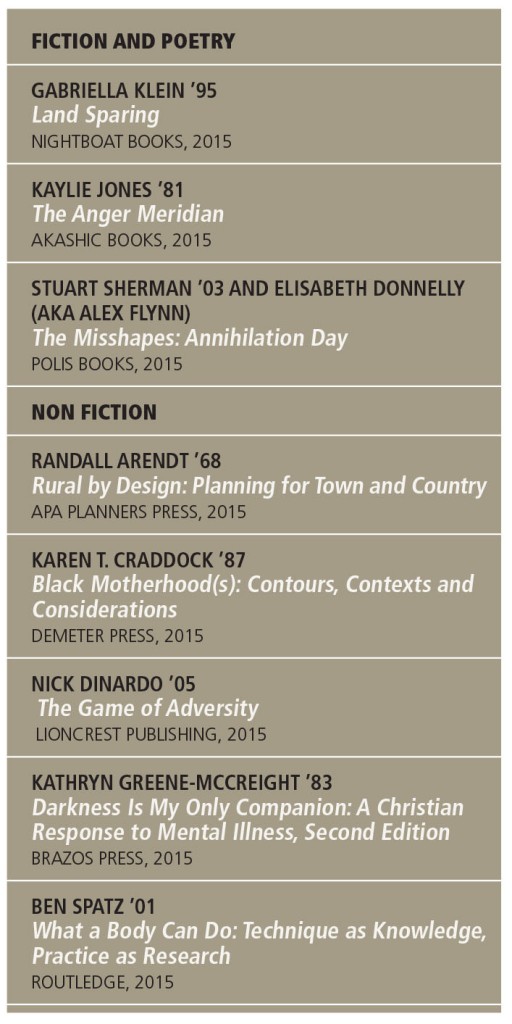JUST PUBLISHED
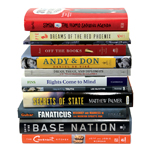
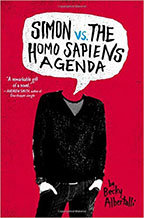 Becky Albertalli ’05
Becky Albertalli ’05
Simon vs. the Homo Sapiens Agenda
HarperCollins, 2015
Clinical psychologist Albertalli has written a charming first novel about 16-year-old Simon Spier who is gay but hasn’t come out to his family and friends. Complications arise when a classmate, Martin, gets hold of some private e-mails and threatens to reveal Simon’s secret unless Simon helps him connect with a female friend. At the same time, Simon has been flirting in e-mails with someone hiding behind the name of Blue, whom he would love to meet in person. Albertalli’s often humorous storytelling succeeds in making the reader care about the everyday lives of teenagers. While she recognizes that it may be somewhat easier for a young person to come out in some situations and parts of the country than it was a decade ago, it is still traumatic and unsettling for a gay teenager to be treated as going against the norm while having to figure out whom to trust.
 Rick Barot ’92
Rick Barot ’92
Chord
Sarabande Books, 2015
Barot’s third poetry collection is graced by the elegant and rigorous language of his past two books as he masterfully bridges inner and outer worlds and connects personal experience with the universal. Barot comments: “I wrote the poems in Chord during a particularly intense period in American history: Post 9/11. The Iraq War. Obama’s election. As it has been for many, the last decade has meant for me a low-grade rage and anxiety, and often it hasn’t been low-grade at all, but a full-blown condition of living. The book is a record of that wounded time—a time, it’s worth noting, that continues in the present. In addition to the societal stresses that informed the writing of the book, there were also personal griefs during the same period that called a good number of the poems into being. The poems in the middle section of the book look back at my childhood in the Philippines, at family life, at intimate family losses. At the heart of the book, then, are nostalgia and grief.”
 Daniel de Visé ’90
Daniel de Visé ’90
Andy and Don: The Making of a Friendship and a Classic American TV Show
Simon and Schuster, 2015
This highly entertaining book gives a unique perspective on the beloved television sitcom, The Andy Griffith Show, which has never been off the air thanks to syndication since it premiered more than 50 years ago. The book traces the production of the program and celebrates the friendship of the two stars of the show, Andy Griffith and Don Knotts, who played, respectively, Sheriff Andy Taylor and Deputy Barney Fife, who shared folksy conversations on the front porch in the idealized rural hamlet of Mayberry. The duo worked only five years together on their show but continued to stay in touch after Knotts left the show, maintaining a complicated friendship. De Visé (Knott’s brother-in-law) writes: “Andy was a master entertainer and an occasionally brilliant dramatic actor. Don was a comedic great, his oeuvre a sort of missing link between the celebrated eras of Jerry Lewis and Woody Allen. Yet like all the best comedy teams, Andy and Don were better together than apart.”
 Joseph J. Fins ’82, MD
Joseph J. Fins ’82, MD
Rights Come to Mind: Brain Injury, Ethics, and the Struggle for Consciousness
Cambridge University Press, 2015
Dr. Fins, a professor of medical ethics, traces the evolution of the medical classification of severe brain injury and recognizes what he calls “a deeply marginalized class” of society. He draws upon interviews with 53 families of people with brain injuries who are identified as in a minimally conscious state and reveals that patients are often incorrectly categorized as being in a vegetative state, or having an absence of responsiveness or awareness. As a result, care options for these patients lessen and society tends to neglect them even when advances in neuroscience offer new ways to deal with brain injury. In fact, up to 40 percent of patients with traumatic brain injury in nursing homes diagnosed as vegetative are actually minimally conscious. The book focuses on Margaret Worthen, who in 2006 suffered a severe brain injury; she was initially diagnosed as vegetative, but thanks in part to her mother Nancy’s perseverance, and physicians who argued Margaret may have shown signs of consciousness, she was found to be minimally conscious. The final years of her life included remarkable milestones such as recognition of family members and communication through eye movement. Fins argues that the restoration of functional communication leads to the reintegration of these patients into their community and is consistent with the goals of the Americans with Disability Act.
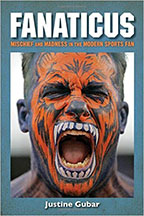 Justine Gubar ’88
Justine Gubar ’88
Fanaticus: Mischief and Madness in the Modern Sports Fan
Rowman and Littlefield, 2015
ESPN television producer and investigative journalist Gubar’s book explores the roots of extreme fanaticism of sports fans, from organized thuggery to digital hate speech. She shares her own experience with harassment from fans in 2011 while on assignment to examine troubles within the Ohio State University football team. Her research includes talking to athletes, fans, journalists, security professionals, sociologists, and psychologists, and she uncovers outrageous and shocking incidents from around the world, including firsthand accounts from both the transgressors and victims. She also looks critically at sports leagues, college athletics, law enforcement, the beverage industry, and media to explain the roots of fan misbehavior and dispel common myths that are often cited to understand the mad behavior.
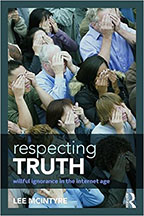 Lee McIntyre ’84
Lee McIntyre ’84
Respecting Truth: Willful lgnorance in the Internet Age
Routledge, 2015
In his latest book, philosopher Lee McIntyre considers how the human race has now reached an increased level of ignorance in modern times because of the sheer volume of misinformation, the speed with which it can be digitally shared on the Internet and in the media, and the skillful exploitation of untruths by those who wish to advance their ideological agendas regarding such issues as global warming, evolution, race, and vaccinations. The author encourages us to fight back against those who indulge in certain irrationalities and wrong-headed beliefs. McIntyre stresses the importance of using tested scientific methods for arriving at true beliefs, and argues that our future survival depends on a more reasonable world. Chapters consider the value of truth, the roots of human irrationality, sources of misinformation, and sources of hope.
 Jeff Morgan ’75 and Jodie Morgan
Jeff Morgan ’75 and Jodie Morgan
The Covenant Kitchen: Food and Wine for the New Jewish Table
Schocken Books, 2015
Written by two veteran cookbook authors and owners of the acclaimed Covenant Winery in California, this kosher cookbook, with more than 100 enticing recipes complete with suggested wine pairings, offers a contemporary approach to dining in the Jewish tradition, reflecting the authors’ lives in Northern California. You don’t have to keep a kosher kitchen to follow the recipes, which draw upon the cuisines of Italy, Provence, North Africa, Asia, California, and Israel. The book includes informative sidebars on how to select the right wine for any occasion, on the requirements for kosher food preparation, and on how to prepare the basics, as well as sample menus for Jewish holidays and the fascinating story of wine in ancient Israel and throughout Jewish history.
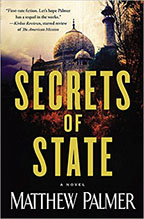 Matthew Palmer ’88
Matthew Palmer ’88
Secrets of State
Putnam, 2015
In Palmer’s second suspense novel, Sam Trainor, formerly the top South Asia expert in the State Department’s Bureau of Intelligence and Research, has moved on to work in the private sector as an analyst for the consulting firm Argus Systems, which supplies intelligence to the CIA. He soon learns that despite their similarities, the government and their hired contractors have very different motives, and he finds it difficult to adjust to a more corporate, profit-driven environment. Sam comes across a transcript of a phone conversation about the fastest ways to upend the delicate political balance keeping India and Pakistan from all-out war, but he knows that conversation can’t have occurred as he is having an affair with one of the alleged participants. As he explores the source of the misinformation, he learns someone is manipulating the intelligence to encourage the simmering conflict between nuclear-armed rivals India and Pakistan. Argus sends Sam to Mumbai, where he must try to diffuse a bomb placed by terrorists. Huffington Post calls the book “a gut-churning international thriller whose all-too-real plot line makes one contemplate the dangers of the world in which we live.”
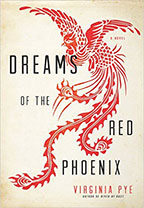 Virginia Pye ’82
Virginia Pye ’82
Dreams of the Red Phoenix
Unbridled Books, 2015
Pye’s second novel, inspired by her own grandmother’s life, takes place in China during the dangerous summer of 1937. Shirley Carson, a recently widowed American missionary, finds herself and her teenage son, Charlie, in the world of a Japanese invasion of North China and the simultaneous rise of Communism. An attractive Red Army officer requests the help of her nursing skills for his soldiers. While still grieving, she finds herself wanting to help the idealistic Communists. But she also must consider escaping the war-ravaged country with her son before it is too late. In the Richmond Times-Dispatch, reviewer Jay Strafford writes: “A tale of idealism and courage, deceit and treachery, Dreams of the Red Phoenix blends religion, family, geopolitics, and history into a hearty, heartwarming and heart-rending feast of fact-based fiction, one inspired by Pye’s imagination and rendered with care and love.”
 David Vine ’97
David Vine ’97
Base Nation: How U.S. Military Bases Abroad Harm America and the World
Metropolitan Books, 2015
More than two decades after the end of the Cold War, the United States still stations its troops at 800 military bases abroad—places that are usually taken for granted or overlooked entirely. Vine’s book reveals that the worldwide network of bases may actually make America less safe in the long run, as they raise geopolitical tensions and encourage widespread antipathy towards the United States. They also undermine American democratic ideals, pushing the United States into partnerships with dictators and perpetuating a system of second-class citizenship in territories like Guam. Vine argues that they strain the lives of military families, breed sexual violence, displace indigenous people, and hurt the environment, while the financial cost of maintaining these bases approaches $100 billion per year. Over six years, the author visited more than 60 bases in 12 countries and territories. He notes that a bipartisan coalition has finally started to question the value of keeping all these locations open.
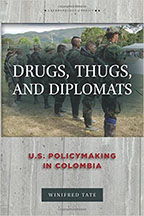 Winifred Tate ’93
Winifred Tate ’93
Drugs, Thugs, and Diplomats: U.S. Policymaking in Colombia
Stanford University Press, 2015
This anthropological study of policymaking concentrates on the design, implementation, and consequences of Plan Colombia, a major aid package passed by the United States that aimed to help Colombia cut drug trafficking, defeat leftist guerrillas, support peace, and build democracy. More than 80 percent of the assistance was military aid, at a time when the Colombian security forces were tied to abusive, drug-trafficking paramilitary forces. Tate examines the practice of foreign policy by the U.S. State Department, the Pentagon, Congress, human rights advocates, and peasant coca farmers. Her work reveals how policymakers’ utopian visions and emotional entanglements play a major part in their efforts to orchestrate social transformation abroad. She suggests that U.S. officials’ zero tolerance for illegal drugs provided the impetus for the subsequent militarization of domestic drug policy abroad. Her analysis also examines how oppositional activists and the policy’s targets—civilians and local state officials in southern Colombia—attempted to present policy alternatives through association with NGOs, protests, and formal lobbying.
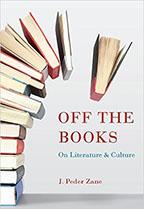 J. Peder Zane ’84
J. Peder Zane ’84
Off the Books: On Literature and Culture
The University of South Carolina Press, 2015
This splendid collection brings together 130 columns by Zane when he served as book review editor and books columnist for the News & Observer in Raleigh, N.C., for 13 years. The first six sections concentrate on reviews of classic and contemporary fiction and nonfiction, profiles of writers, and columns on the book business; several selections connect books to larger and literary cultural trends. The last six sections provide cultural commentary, touching on how books can help us understand the world around us, addressing such issues as 9/11, race, gay rights, the decline of high culture, and the rise of sensationalism and solipsism in society. In his introduction, Zane writes that his columns are “historical documents of a vanishing culture, evidence of a time when mid-sized newspapers recognized the value of literature.… Despite the assaults, onslaughts and indignities, books remain the vital core of our culture. They are the greatest tool humanity has devised to share deeply felt emotions and profound ideas publicly.”

